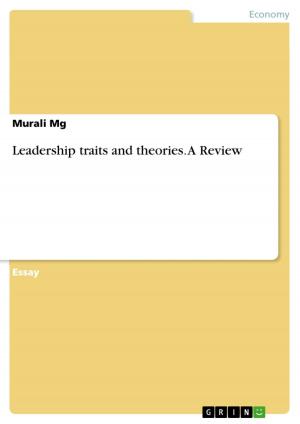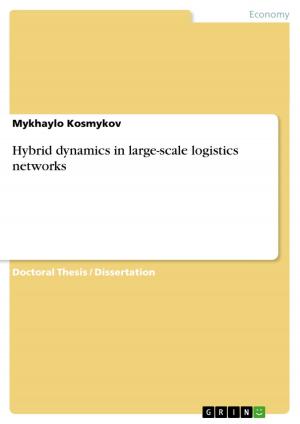'Boundaryless' career - Implications for individual and organisational learning
Implications for individual and organisational learning
Business & Finance, Human Resources & Personnel Management| Author: | Benjamin Toric | ISBN: | 9783640129034 |
| Publisher: | GRIN Publishing | Publication: | August 4, 2008 |
| Imprint: | GRIN Publishing | Language: | English |
| Author: | Benjamin Toric |
| ISBN: | 9783640129034 |
| Publisher: | GRIN Publishing |
| Publication: | August 4, 2008 |
| Imprint: | GRIN Publishing |
| Language: | English |
Scientific Essay from the year 2007 in the subject Business economics - Personnel and Organisation, grade: Disctinction, University of Newcastle upon Tyne, 17 entries in the bibliography, language: English, abstract: ABSTRACT As companies seamlessly move across the globe in search of talent and resources, so to are highly skilled individuals taking up this opportunity to choose a job which best meets their goals and expectations. People are making more frequent job moves than in the past, in their pursuit of boundaryless careers. This unpredictable, non-linear career creates opportunities as well as problems for both individuals and organisations. In particular, it affects both individual and organisational learning, and, since knowledge is power, it affects the prosperity of both. Both individuals and companies need to ensure that boundaryless careers do not adversely affect learning at the person and organisational level. At the person level, lack of learning has clear implications for future employability. At the organisation level, lack of learning will adversely affect long-term (and in today's fast-changing world, even short-term) company performance. Employees are left with little choice but to learn continuously and to expand their networks to maintain employability. Organisations, on the other hand, are left with little choice but to provide interesting and meaningful work, as well as broad management support, that enhances individual's skills and develops and sustains careers. 1. Introduction Globalisation and technological advances are bringing new opportunities as well as challenges to both individuals and organisations. As companies seamlessly move across the globe in search of talent and resources, so to are highly skilled individuals taking up this opportunity to choose a job which best meets their goals and expectations. Evidently, both men and women are making more frequent job moves than in the past (Ackah and Heaton, 2004) keenly, perhaps, navigating across employers and geographies, aided by extensive social and professional connections (Arthur and Rousseau, 1996). This new breed of people are pursuing boundaryless careers - careers, it seems, limited only by their imagination. This chaotic, nonlinear, network-centered career (Arthur and Rousseau, 1996) is marked by a variety of tasks, redefinitions of one's profession, fits-and-starts (Mirvis and Hall, 1994), which creates opportunities as well as problems for both individuals and organisations. (...)
Scientific Essay from the year 2007 in the subject Business economics - Personnel and Organisation, grade: Disctinction, University of Newcastle upon Tyne, 17 entries in the bibliography, language: English, abstract: ABSTRACT As companies seamlessly move across the globe in search of talent and resources, so to are highly skilled individuals taking up this opportunity to choose a job which best meets their goals and expectations. People are making more frequent job moves than in the past, in their pursuit of boundaryless careers. This unpredictable, non-linear career creates opportunities as well as problems for both individuals and organisations. In particular, it affects both individual and organisational learning, and, since knowledge is power, it affects the prosperity of both. Both individuals and companies need to ensure that boundaryless careers do not adversely affect learning at the person and organisational level. At the person level, lack of learning has clear implications for future employability. At the organisation level, lack of learning will adversely affect long-term (and in today's fast-changing world, even short-term) company performance. Employees are left with little choice but to learn continuously and to expand their networks to maintain employability. Organisations, on the other hand, are left with little choice but to provide interesting and meaningful work, as well as broad management support, that enhances individual's skills and develops and sustains careers. 1. Introduction Globalisation and technological advances are bringing new opportunities as well as challenges to both individuals and organisations. As companies seamlessly move across the globe in search of talent and resources, so to are highly skilled individuals taking up this opportunity to choose a job which best meets their goals and expectations. Evidently, both men and women are making more frequent job moves than in the past (Ackah and Heaton, 2004) keenly, perhaps, navigating across employers and geographies, aided by extensive social and professional connections (Arthur and Rousseau, 1996). This new breed of people are pursuing boundaryless careers - careers, it seems, limited only by their imagination. This chaotic, nonlinear, network-centered career (Arthur and Rousseau, 1996) is marked by a variety of tasks, redefinitions of one's profession, fits-and-starts (Mirvis and Hall, 1994), which creates opportunities as well as problems for both individuals and organisations. (...)















